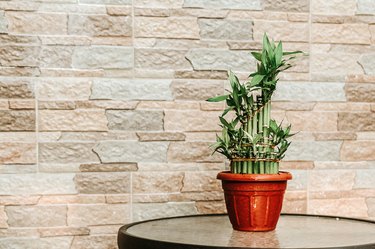
If you're a cat owner, chances are your feline companion runs the house in his own unique way. Certain areas may be secured territory for your cat, and he may be unwelcoming to visitors, like new furry companions, inside the home. That said, if you're looking to add new life to your space, houseplants can be a great way to bring a breath of fresh air and a new design element into the home. Before you bring your potted plants home, however, it's important to research which are safe for felines, and which aren't, as many can be toxic when ingested.
Plants and cats
Video of the Day
A cat-filled home can feel comforting and alive, and adding plants to that mix can raise the bar even higher. Not only are houseplants easy on the eyes, but many of them also offer air-purifying properties and make great additions to rooms like offices or bedrooms. When choosing the right plant for your home, however, you'll need to take special precaution to ensure that the foliage you pick is safe for your cat, as many plants can be toxic to felines and may result in symptoms like an upset stomach.
Video of the Day
Common plants to steer clear of include sage palm, lily of the valley, aloe, and devil's ivy, according to the ASPCA. Vetstreet adds that certain fern varieties, like the emerald fern and the ubiquitous philodendron, can lead to irritation of the mouth if chewed or swallowed. Before adding any new plants to a home you share with your cat, it's essential that you research the variety, especially if your feline friend is the chewing type.
Is bamboo toxic to cats?
While there are certainly several plants to steer clear of for the sake of your cat's health, there are a number of non-toxic plants for cats that will make a great addition to any home. One such plant is the sturdy, easy-to-maintain, and aesthetically pleasing bamboo. Bamboo is an excellent indoor plant of choice for plant caretakers of all levels, from the novice who "can't keep anything alive" to the accomplished grower with a green thumb. Unlike poisonous houseplants, when it comes to bamboo, cats are actually not the party to keep an eye on in the relationship, as it's your feline friend who can end up being harmful to the plant, not the other way around.
When it comes to cats' safety, however, not all bamboo is created equal. Unlike the ubiquitous golden bamboo you may see housed in glass dishes on countertops and windowsills, lucky bamboo is not safe for cats. Also known as Dracaena sanderiana, lucky bamboo differs from golden bamboo in that it is not actually bamboo at all, but rather, looks similar to the species for its tough stalks and bright leaves, explains Good Housekeeping.
If your cat has ingested lucky bamboo, it may lead to mild to moderate symptoms, like drooling, vomiting, abdominal pain, or diarrhea, according to Pet Poison Helpline. Because the two varieties of bamboo can appear similar, it's best to either consult your veterinarian if you're worried that your bamboo is toxic or leave it out of your home altogether, just to be safe.
Plants safe for cats
In addition to bamboo, there are a number of other indoor houseplants that can make for a safe addition to any cat-filled home. HGTV lists Christmas cactus, Swedish ivy, prayer plants, and areca palms, among others, as safe varieties to consider when looking to add leaves to any room. Spider plants are another easy-to-grow option, but its dangling shoots may end up taking a beating if you have a particularly paw-happy cat, so beware. Additionally, the Boston fern is also known for being non-toxic to animals, unlike other varieties of fern plants, so if you can't live without those fan-like fronds, this may be the cat-safe plant for you.
Always check with your veterinarian before changing your pet’s diet, medication, or physical activity routines. This information is not a substitute for a vet’s opinion.